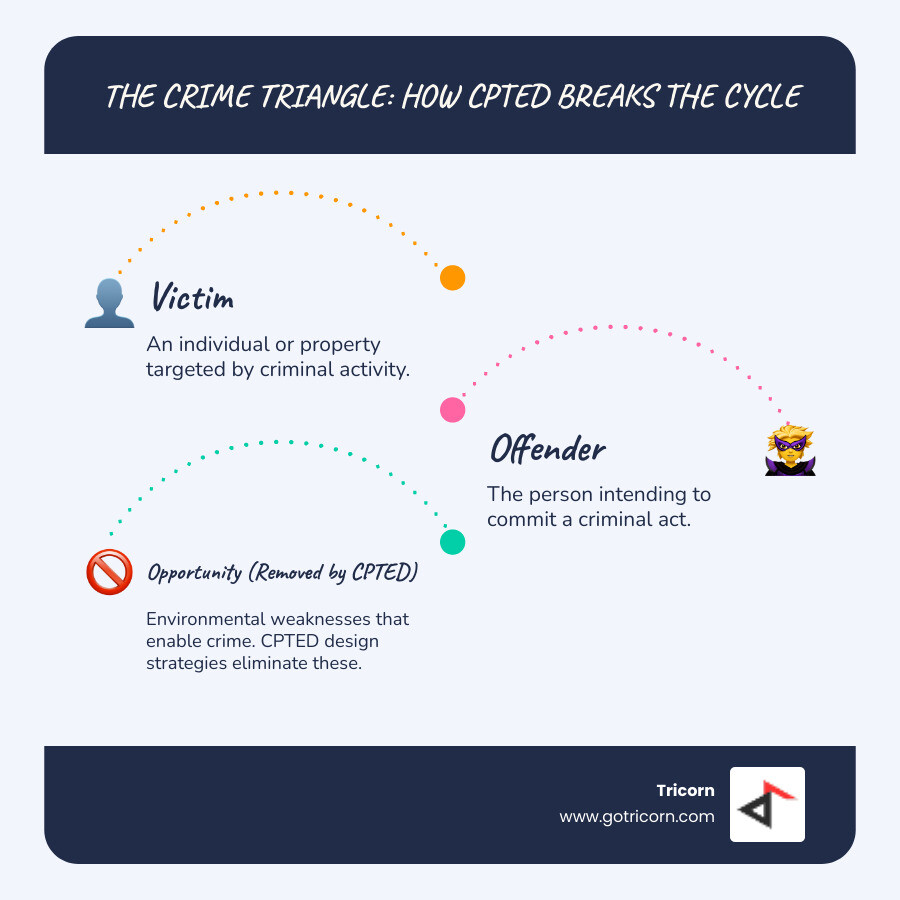October 10, 2025
A CPTED audit report is a comprehensive assessment that evaluates your property's design against Crime Prevention Through Environmental Design (CPTED) principles. It's a strategic blueprint showing how your property's environment either deters or encourages criminal behavior. The report identifies security vulnerabilities, provides photographic evidence, and delivers prioritized, actionable considerations to reduce crime and improve safety.
Key sections typically include:
CPTED is a proactive security strategy that uses the built environment to reduce crime opportunities before they occur. It addresses root causes rather than reacting to incidents. For multi-family housing owners in Florida, these reports are critical. They not only improve safety but also reduce liability under statutes like Florida Statute 768.0706, improve quality of life for residents, and increase property values.

Crime Prevention Through Environmental Design (CPTED, pronounced "sep-ted") is a proactive approach that uses the design of buildings, landscapes, and neighborhoods to reduce crime opportunities and make people feel safer. Instead of reacting to crime with more locks or guards, CPTED shapes the environment to address the root causes of criminal activity. For more insights into what CPTED truly is, explore our detailed guide.
The core philosophy of CPTED is simple: criminals seek easy targets where they can operate unnoticed. CPTED disrupts this by designing spaces that increase the risk of detection. A dark, isolated corner with overgrown bushes invites trouble, while a well-lit pathway with clear sightlines signals that people are watching.
By using environmental cues, CPTED influences behavior psychologically. It's not about building fortresses, but about creating natural surveillance—what urban planners call "eyes on the street." When legitimate users feel comfortable in a space, they become informal guardians, discouraging criminal activity simply by being present. A CPTED audit report systematically examines design elements like lighting, landscaping, and window placement to see if they support or undermine safety.
While reducing crime is a primary goal, CPTED's benefits are far-reaching. Implementing its principles leads to:
CPTED is built on four fundamental principles that work together to create safer environments: Natural Surveillance, Natural Access Control, Territorial Reinforcement, and Maintenance. When combined, they form a comprehensive approach to crime prevention.
This principle is based on a simple truth: criminals don't want to be seen. Natural surveillance involves designing spaces to maximize visibility and eliminate hiding spots. This is achieved through:
This principle uses design to guide people along intended routes and discourage access to vulnerable areas. Instead of random foot traffic, spaces are designed to channel people toward visible, monitored entrances. This includes:
Territorial reinforcement fosters a sense of community ownership, which makes residents more vigilant. When people feel a space is "theirs," they are more likely to notice strangers and report problems. This is encouraged by:
Rooted in the "Broken Windows Theory," this principle states that visible signs of neglect attract more disorder. A well-maintained property sends a clear message: this place is actively managed, and criminal behavior will not be tolerated. Key aspects include:
A CPTED audit report translates theoretical principles into a practical security roadmap for your property. It's a strategic document that identifies specific risks and provides concrete steps to address them. At Tricorn, we analyze how every design choice impacts safety, delivering a report that offers clarity and a plan for meaningful improvement. Discover the range of CPTED services we offer to meet your specific needs.
A comprehensive report involves several critical stages. The process begins with an initial consultation to understand your property's specific concerns and a review of historical crime data for the area. This is followed by crucial day and night site assessments, as a property's vulnerabilities can change dramatically after dark. Our assessors systematically observe and photograph the property through the lens of the four CPTED principles. This data is then used to perform a detailed vulnerability analysis, which connects our observations to potential risks. The process culminates in the final report, which synthesizes all findings into an actionable plan. Scientific research on developing CPTED audits supports this evidence-based approach.
A well-structured report follows a logical format for clarity and ease of use:
Based on over 300 assessments of Florida multi-family properties, certain recommendations appear frequently:
At Tricorn, we deliver these recommendations through our proprietary CPTED Tech platform, which enables real-time reporting and makes it easy for you to track implementation progress. Learn more about our comprehensive CPTED services.
Acting on a CPTED audit report creates tangible benefits for property owners, residents, and law enforcement by improving safety and reducing costs.
For property owners, implementing CPTED strategies is a sound business decision. By removing opportunities for crime, you can achieve:
The positive impact on residents is profound. A safer environment leads directly to a reduced fear of crime and an improved quality of life. When people feel secure, they are more likely to use public spaces, connect with neighbors, and develop a stronger sense of community. This collective ownership becomes a powerful, organic form of security.

CPTED makes law enforcement's job more effective and efficient. It fosters a proactive partnership between police and property owners. Properties that implement CPTED principles typically see reduced calls for service, which allows police to allocate resources more efficiently. Furthermore, well-lit properties with clear sightlines create safer patrolling environments for officers and can provide valuable evidence for investigations if an incident does occur.
While powerful, CPTED is not a perfect solution. Understanding its limitations and how the field is evolving helps property managers integrate it effectively into a broader security strategy.
Property managers often face a few common challenges when implementing CPTED:
CPTED auditing has evolved from simple checklists to sophisticated, data-driven processes. Modern assessments integrate crime statistics and demographic data, and they always include both day and night site visits to get a complete picture of a property's vulnerabilities. This evolution, supported by academic research and international standards like ISO 22341, ensures that today's reports are more nuanced and effective. Academic insights on CPTED's evolution highlight this shift toward a more evidence-based discipline.
CPTED is most effective as part of a layered security strategy. It excels at situational crime prevention by reducing the opportunity for crime to occur. However, it should be combined with other approaches, such as community policing efforts and organized security measures (guards, alarms, CCTV). A holistic strategy addresses both the environmental opportunities for crime and the motivations behind it. Our CPTED services are designed to integrate seamlessly into a complete safety ecosystem for your property.
Your CPTED audit report is more than an assessment; it's an actionable roadmap to a safer, more valuable property. By implementing the core principles of Natural Surveillance, Natural Access Control, Territorial Reinforcement, and Maintenance, you shift from a reactive to a proactive security posture. This approach protects your investment, reduces liability, and creates a community where residents feel secure and want to stay.
The benefits are clear: improved tenant satisfaction, higher property values, and for Florida properties, a straightforward path to demonstrating due diligence under statutes like Florida Statute 768.0706.
With over 300 assessments for multi-family properties, Tricorn has seen how these changes transform communities. Our proprietary technology delivers CPTED audit reports that are comprehensive, easy to understand, and immediately actionable. We provide a blueprint you can use to make a real difference.
If you're managing a property in Jacksonville and want to improve safety while ensuring compliance, our team has the expertise to help you steer the unique challenges Florida properties face.
Connect with Tricorn
We’re just one message away.
Drop us a line and let’s talk safety, strategy, or your next smart move.